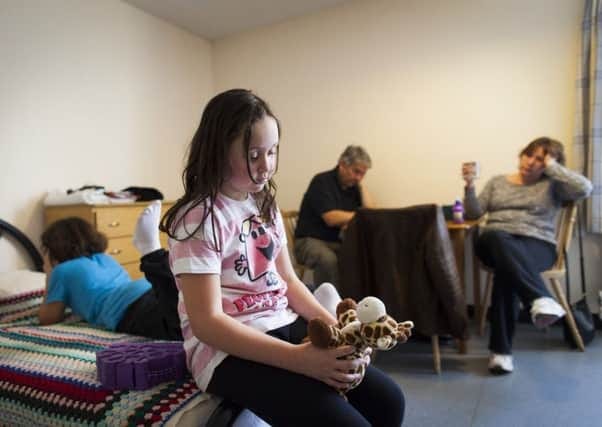EXCLUSIVE: 3500 Children Spend Christmas in Temporary Accommodation in Glasgow
Rising Costs of Temporary Housing Hits £326 Million
Merry Christmas to all our readers! 🎄 We hope your day is paws-itively wonderful. Michael Jordan captured this howl-arious scene: a loyal pup, above, tied to an imitation Christmas lamppost from Transylvania Coffee, patiently 'paws-ing' while their owner gets a quick 'fur-style' at Kings Turkish Barbers on Victoria Road. A truly fetching holiday moment!
EXCLUSIVE by Gary Fanning
About 3500 children will wake up on Christmas Day living in temporary accommodation in Glasgow, according to the latest figures.
As of December 17, 3499 children are living with their families in temporary housing. This marks a 34% increase compared to 2021, when 2606 children in the city lacked a permanent home on Christmas Day.
Figures from Glasgow City Council show that on Christmas Day:
2021: 2606 children were living in temporary accommodation.
2022: 2746 children were living in temporary accommodation.
2023: 3047 children were living in temporary accommodation.
2024 3499 children living in temporary accommodation (as of December 17)
The total number of people, including adults, in temporary accommodation has also risen:
2021: 6139 people.
2022: 6524 people.
2023: 7321 people.
2024: 8064 people (as of October 1).
Temporary accommodation includes hostels, hotels, and council-run flats used to house families and individuals while longer-term housing is sought.
Rising Costs of Temporary Housing
The financial burden of temporary accommodation has increased significantly in recent years. Glasgow City Council’s data reveals net spending of £206 million and gross spending of £322 million from January 2021 to October 2024:
2021: £50.5 million (net) / £76.4 million (gross).
2022: £53.4 million (net) / £78.4 million (gross).
2023: £54.9 million (net) / £83.8 million (gross).
2024 (up to October): £47.3 million (net) / £83.9 million (gross).
Homelessness charities have warned these costs are unsustainable and highlight the urgent need for investment in affordable housing to reduce dependency on temporary solutions.
A Growing Crisis
Advocates argue that rising numbers reflect systemic issues, including a shortage of affordable housing and the impact of the cost-of-living crisis.
Shelter Scotland and other organisations have urged the Scottish Government to prioritise affordable housing projects and strengthen local services to prevent families from becoming homeless.
Charities describe these figures as a stark reminder of the housing pressures facing Glasgow.
Alison Watson, Director of Shelter Scotland, pictured below, said: “The devastating reality of Scotland’s housing emergency means that more people are living in miserable conditions, having their housing rights ignored, and more children trapped in a broken homelessness system.
“Building more social homes is the only way to end the housing emergency, and the government knows this. Investment in social housing is an investment in the people of Scotland and generations to come.”
Sean Clerkin of the Scottish Tenants Organisation, have called for the resignation of Housing Minister Paul McLennan.
Mr Clerkin described the current state of homelessness as “completely out of control.”
A spokeswoman for Glasgow’s Health and Social Care Partnership said: “It’s a very unfortunate situation and certainly not one we wish anyone to be in.
“It is well documented that the housing system in Glasgow is experiencing extreme pressure.
“We have no council housing in Glasgow. We rely on Registered Social Landlords (RSLs) who have high demands themselves in terms of housing need to meet, as well as in relation to homelessness.
“We work well with these RSLs, and they are committed to providing us with accommodation, but the demand far outstrips availability which means people – including children - are spending longer in emergency and temporary accommodation than any of us would want.
“We’ve had to expand our use of bed and breakfast in an attempt to meet the current demands for homelessness assistance and avoid people having to sleep rough.”
The Scottish Government has allocated a £100 million multi-year fund to prevent homelessness, reduce rough sleeping, and decrease reliance on temporary housing. However, critics argue that the measures must go further to address the root causes of the crisis.
Analysis: Glasgow's Housing Crisis Demands Urgent Action
The revelation that 3500 children will spend Christmas in temporary accommodation in Glasgow should be a wake-up call to policymakers, citizens, and organisations alike. This troubling figure—part of a broader housing emergency—highlights systemic failures that require immediate and sustained attention.
A Stark Reminder of Inequality
Christmas is a time often associated with warmth, stability, and family. For the thousands of children waking up in hostels, hotels, or other temporary housing, this ideal is painfully out of reach.
The fact that the number of children in temporary accommodation has risen by 34% since 2021 underscores not just a housing crisis but a deepening inequality in one of Scotland’s largest cities.
Temporary accommodation is meant to be a stopgap solution, but for many families, it has become a prolonged state of instability.
This is not merely a logistical issue; it’s a humanitarian one. The lack of access to permanent housing disrupts education, mental health, and family cohesion. Children in these situations face long-term disadvantages, perpetuating cycles of poverty.
The Economic Cost of Inaction
The financial burden of temporary accommodation on Glasgow City Council has ballooned to over £83 million in gross spending for 2023 alone. While this expenditure is necessary to meet immediate needs, it’s clear that pouring money into temporary solutions without addressing root causes is unsustainable.
Investing in social housing would not only alleviate these costs over time but also provide families with the stability they need to thrive. Research consistently shows that every pound spent on social housing yields returns in reduced healthcare costs, improved educational outcomes, and greater economic productivity. The current approach amounts to a fiscal Band-Aid on a systemic wound.
Systemic Failures Exposed
The rise in temporary accommodation use reflects broader systemic issues. The cost-of-living crisis, a shortage of affordable housing, and overburdened social services have created a perfect storm. Glasgow’s reliance on Registered Social Landlords (RSLs), while essential, is insufficient to meet the demand for permanent housing.
Alison Watson of Shelter Scotland has rightly called for a “step change” in tackling Scotland’s housing emergency. This means reversing cuts to affordable housing budgets, accelerating the pace of new social housing projects, and ensuring that existing housing stock is maintained and utilisled efficiently.
A Crisis of Political Will
While the Scottish Government has allocated a £100 million multi-year fund to address homelessness, critics argue that this falls short of what is needed to tackle the crisis comprehensively.
Campaigners like Sean Clerkin have highlighted the disconnect between policy announcements and the reality on the ground, where families remain trapped in unsuitable accommodations like hotels and B&Bs.
What’s missing is a sense of urgency and bold leadership. Housing Minister Paul McLennan’s tenure has come under fire for presiding over these worsening statistics. However, the issue extends beyond one minister or one government; it’s a challenge that demands cross-party collaboration and long-term commitment.
The Moral Imperative
At its core, the housing crisis is a moral issue. Allowing thousands of children to grow up in temporary accommodation—particularly during a season that symbolises hope and togetherness—is a failure of society. The solutions are well-documented: build more social housing, increase support for homelessness prevention, and address the root causes of economic inequality.
What Needs to Happen Now
Accelerate Social Housing Projects: The Scottish Government must fast-track the development of social housing, with clear timelines and accountability mechanisms.
Strengthen Homelessness Prevention: More funding and resources should be directed towards programs that keep families in their homes, including rent support and mediation services.
Improve Temporary Accommodation Standards: While families remain in temporary housing, their living conditions must be safe, dignified, and suitable for children.
Engage the Private Sector: Incentives for private developers to include affordable housing in new projects could help address shortages in the short term.
Conclusion: A Call to Action
Glasgow’s housing crisis is not an inevitable reality; it is the result of choices made over years.
This Christmas, as the city reflects on the stark contrast between abundance and scarcity, let this crisis serve as a rallying cry for systemic change.
Investing in housing is not just an economic imperative but a moral one—a commitment to ensuring that every child has a stable place to call home, not just for the holidays but for life.
Send your views to news@glasgowsplash.com







